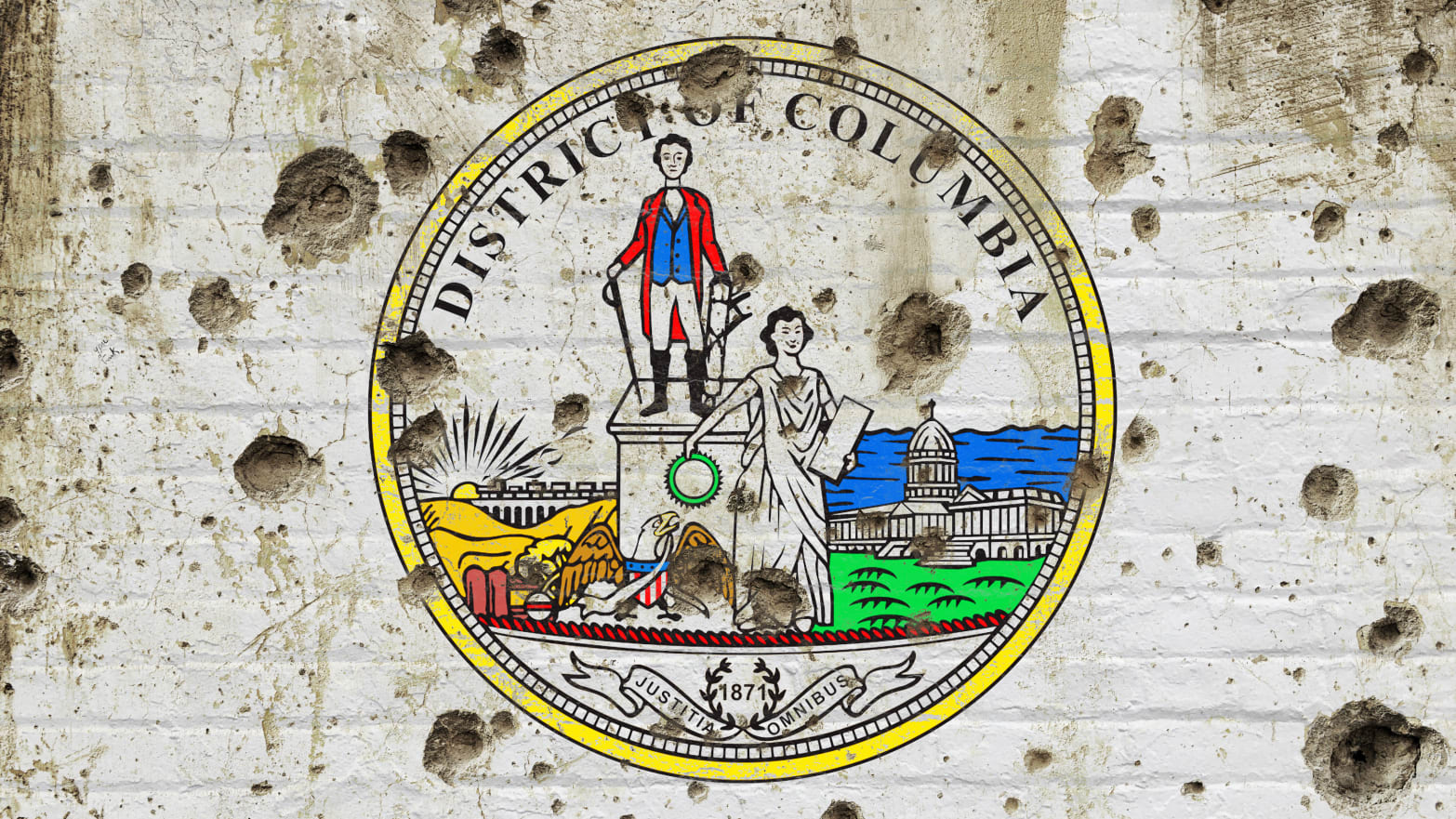Photo Illustration by Thomas Levinson/The Daily Beast/Getty
Like many cities, the District of Columbia has seen gun violence rise even as overall crime has declined. Ghost guns have flooded into the city, prompting DC Democratic Party chair Charles E. Wilson to take his kids trick-or-treating in a safer area than Anacostia, where he lives. He made the right choice. While they were out, random gunshots struck his house.
One big reason for DC’s problems is that its judicial system, controlled by Congress, is a mess. There are crippling vacancies on the Superior Court (14 of 62 seats unfilled) and Appeals Court (three of nine seats unfilled).
The result is that the courts are so backed up that people can spend more time waiting for a hearing than they would serve if convicted. And it’s not just criminal prosecutions that suffer, it’s child custody fights, family law, and the settling of estates—the stuff of everyday life.
The Senate confirmed by voice vote more than a dozen Biden judges before leaving for the holidays but none for the District of Columbia. Florida Senator Rick Scott blocked a move to confirm several DC nominees by unanimous consent, returning them to wait in line indefinitely for another opening in a crowded legislative calendar.
“I have absolutely no faith that Joe Biden’s radical far-left nominees will uphold the rule of law,” Scott said by way of explanation.
Republicans like to call for law and order, but where are the judges?
“Until we get statehood, we will not have full control of our courts,” says Rep. Eleanor Holmes Norton, DC’s non-voting member of Congress. She offers an interim solution, the DC Vacancy Reduction Act, that would apply the same standard of congressional oversight for DC judges as DC legislation—a review period of 30 working days, after which legislation is approved.
“I simply want it to apply to judges,” Norton told the Daily Beast. “We see people just for spite opposing DC, but this has become a crisis. We’re talking about our civil courts and our criminal courts at a time when there is a DC gun crisis with shootings. It’s a matter that I regard as an emergency,” she said, adding that it’s not about Democrats versus Republicans, since both parties agree the DC seats should be filled.
Doug Buchanan, director of media and public relations for the DC courts, came over from the fire department last year when his predecessor retired after 20 years. He arrived as Mayor Muriel Bowser appeared to be blaming the courts for the increase in crime. Now, with the mayor agreeing the courts are in crisis, he laid out the problem in a lengthy statement, first published in The Washington Post, ticking off alarming statistics and what they mean for the DC judicial system and its hundreds of thousands of residents.
“The District of Columbia Courts have reached a critical state as it pertains to the vacancies on the bench,” he wrote. “Those who can help must act now. It is a matter of public safety and justice.”
Buchanan points out that jury trials recently resumed in DC Superior Court, where there are over ten thousand criminal cases currently pending—more than twice the case load at the same time last year. The three missing judges, out of nine, on the Court of Appeals, mean more than 200 cases per year will be delayed because of a decrease in the number of panels that can be constituted.
“These delays have a tangible impact on businesses and individuals seeking timely resolution of their disputes,” he writes. “Additionally, these delays impact the public perception on the administration of justice in the District of Columbia and the predictability of the local legal environment.”
Nominees for the federal courts get the primary focus and priority, Buchanan wrote, and that means under Democratic and Republican administration, DC judges are sent to the back of the pack. “This has led to a longstanding vacancy crisis within the local DC Court System, regardless of which party controls the Senate, and we have now reached a point in which we find it necessary to sound the alarm.”
DC judicial nominees are not high-profile or controversial in the same way that U.S. Circuit judges and Appeals Court judges are, so it’s correct to surmise, says Russell Wheeler, a judicial expert at the Brookings Institution, that “the Senate leadership attaches more importance to moving life-tenured federal judges than judges of a local court, the only local court over which the Senate has jurisdiction.”
It’s an anomaly that infuriates DC statehood advocates. “Nowhere else in this country are local state court judges held up by federal U.S. senators,” says Dan Goldberg with Alliance for Justice, a liberal advocacy group. “They’re not handling great constitutional questions, it’s just day-to-day administering of justice.”
Which brings things back to the spike in gun crime that has put more pressure on overburdened and understaffed courts. Charles E. Wilson, the local Democratic official who took his kids across town for safer trick-or-treating, tweeted that night:
“Took the kids 2 ‘safer’ hood bc gun violence. …On the way home got pics from my neighbor. 8 shots and 2 hit the house. 1 bullet n kids room. This is not ok or normal! This must stop!”
Wilson wants smarter government, not just more police. Getting the DC courts filled and functional is the least that the government can do to serve its people.
Because Congress has jurisdiction over DC, Republicans often use the city and its interests as bargaining chips. But there is nothing to be gained here in the partisan struggle for power, just good governance for 400,000 people who remain disenfranchised.

